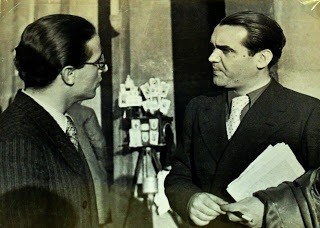Emilio Prados: Three poems from 'The Enclosed Garden'
Translation from Spanish by Donald Wellman

NEXT TO THE STREAM
Dawn
Dreaming cowl,
summer rain:
where goes
the cloud in which you were born?
Forest echo,
heart of wind:
where the voice
that abandoned you in the sky?
Murmur of water
among soft rushes:
where goes
the sparkle of your current?
Human body fleeting,
slender reed:
where did your shadow forget
its nudity?
Beauty, solitude,
silent contemplation:
where is the true
scent of your word?...
(The voice of God
resounds against the age...)
Where, does love
hide its mystery?
ENCLOSED GARDEN
To better gaze upon the night,
I am standing on the shore of my life.
Oh, how many captive stars!
To better gaze upon the night,
I am standing next to the sleeping water.
Oh, how many captive stars!
To better gaze upon the night,
I am standing with my back to the wind.
Oh, how many captive stars!
To better gaze upon the night,
I am standing at the foot of a smile.
Oh, how many captive stars!
(Oh, how many captive stars
at the bottom of my wound!
Oh, how many captive stars
crowning my death throes!...)
To better gaze upon the night,
I am dreaming beside the sleeping water.
Oh, how many stars on the shore!...
To better feel the night
I am going to pull its backbone from the fountain.
Oh, how many departed stars!
.........................................
(Silence stirs the branches...
A jasmine falls onto the water...
Oh, how many stars in my soul!)
To better gaze upon the night,
I am going to sleep on the shores of Nothing.
FINAL SHADOW
Night arises
like a great wall of stone
and time is pushing it
without being able to demolish it...
Stars hang
on one side to sustain it:
the sun, from behind, supports it
with hands of glass;
water makes itself into a flag
and the wind a stanchion,
to better defend it
against its rival
whose determination does not cease...
All changes its course;
for night will not end
unless it attains its destiny.
In front of its wall, raised
on a cross, I await my fate:
a gun shot in the silence,
a target in my solitude
that finally completes the mystery
of so much vain searching
for my name in my thought.
Above the wall of night,
in the phosphorescence of sleep
my finger moist with spirit
is writing its sign...
-Although you don’t see my body
its life is here, death:
get here quickly, if you are to come.
Spit on my chest
and let your burning saliva
melt me into the black lime
of the shadow of the eternity
that is now supporting me.
Thus will I lose my name
and, in losing it, I hope to attain
what I do not find by thinking
and is the cause of my thinking...
In this sign I await you
and the font for this sign
is my complete knowledge.
Here I am. Don’t doubt it any more.
Punch me without mercy.
Night arises
like a great wall of stone
and time pushes against it
unable to demolish it...
Faithful tree of truth,
face to face with night, my body
does not rest from waiting.
My eyes are now evening stars.
[TRANSLATOR'S NOTE. 1937, Edna Saint Vincent Millay published her translation of a poem by Prados, “The Arrival (To Garcia Lorca)” in Spain Sings. Since that time, little attention has been paid to his work by readers of English. In Spain he is thought to be next to Lorca with respect to the depth of his song. Born in Málaga in 1899, he was a student at the Residencia where Lorca, Buñuel and Dali among others also studied. Later he studied philosophy in Freiburg. In the 1920s with the collaboration of Manuel Altolaguirre, he edited and published Litoral, a journal that helped to define the Generation of 1927 (Cernuda, Aleixandre, Guillén, Alberti, among others). A Marxist, he taught the sons of fishermen how to set type for Litoral and for Imprenta Sur. A platonic vision of homoerotic love seems to have been formative with respect to his personality. He was also reclusive and Solitude became his mistress. Prados died in exile in Mexico in 1962. His poetry reflects the loss of homeland and a beautiful gentleness of spirit.]
N.B. Enclosed Garden, a translation of Emilio Prados’ Jardín cerrado by Donald Wellman is forthcoming from Diálogos / Lavender Ink . The poem, “Next to the Stream,” is going to appear shortly in the Xavier Review.]
Poems and poetics